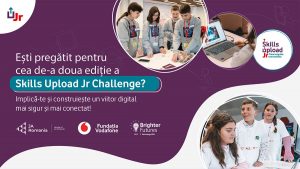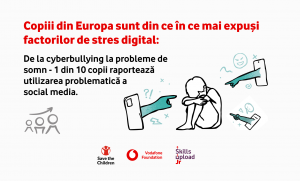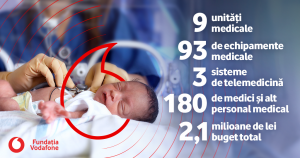- Robots will not take our jobs in the future, but the necessary skills for employment will change:
Bucharest, December 2nd, 2019 – New technologies could have a positive effect on jobs worldwide. However, in order to adapt, more than half of the employees from around the world will require retraining and skill improvement courses in the next five years. This is why, a year and a half ago, the “School in a Box” project was launched, funded by the Vodafone Foundation Romania and carried out by the World Vision Romania Foundation, in ten schools from the rural areas of Vaslui, Ilfov, Ialomița, Cluj, Brașov and Vâlcea counties. It consists of an e-learning platform – www.scoaladinvaliza.ro – and a mobile box fitted with technological equipment. The project expanded considerably, reaching 8,000 beneficiaries in 2019, from 3,700 in the previous year.
According to a study conducted by the World Economic Forum, even though robots and automation might lead to the disappearance of about 75 million jobs in the next five years, the new division of labour between humans, robots and algorithms could create 133 million new jobs. The Vodafone Romania Foundation and the World Vision Romania Foundation believe that the most important investment for the future is in the education of children and in preparing new generations to handle a world dominated by technology, which is constantly changing.
The aim of the “School in a Box” project is to develop the digital skills of teachers and students in primary and secondary schools in rural areas by using an e-learning platform – www.scoaladinvaliza.ro – and a mobile technological box – “Instant Classroom”. The box includes a laptop for the teacher, 25 tablets for the students, a video projector, a sound system, a built-in equipment charging solution, a built-in Wi-Fi router and a 4G modem. With the help of technology, teachers can teach interactive lessons in all subjects.
This year, two new schools have entered the project, and now 5,770 students (compared to 2,400 in 2018) and 320 teachers (compared to 200 in 2019) are enrolled on the www.școaladinvaliză.ro platform. Moreover, 650 digital lessons have been created in 2019, compared to 370 in 2018.
The results mentioned above prove that the use of technology in the classroom transforms the learning experience of the students, the children go to school with a smile on their face, they pay much more attention and retain information faster. This is because the classes have become more interactive, the students can interact more with their classmates and teachers, and they are more creative and connected to the learning process.
“I really like that we get to use the box more during classes, especially because I want to pursue a career in IT, and I want to learn more. Right now I’m learning to code”, said Andrei, a 7th grade student at the No. 1 Middle School in Afumați.
In addition to training students with the help of technology, the project also provides digital training to teachers through courses, webinars and assistance in creating lessons, as well as monthly technical support. The use of the e-learning platform and the box during classes improves and better defines the teaching style of teachers. They develop various skills, such as flexibility, because they prepare lessons online on their own, depending on the level of each class, and creativity, by creating content directly on the platform. Furthermore, this method of teaching helps teachers to organise better during classes, because certain bureaucratic activities have been eliminated, and to have a better record of the students’ level of preparation through the centralised reports on the platform pertaining to the scores obtained in various tests.
“Judging from their reactions, they seem to be delighted. It’s obvious that it’s something they use a lot nowadays, sometimes even more than books. So why not use it for the learning process as well?”, said Mădălina Sebe, a teacher at the No. 1 Middle School in Afumați.
“We can’t go against the grain. And the children, the students, were born in this age, so it’s better to adapt and try to use technology to our benefit and reap the results”, said Valentina Dana Marcu, the principal of Sinești Middle School.
The Vodafone Romania Foundation is a Romanian nongovernmental charitable organisation, established in 1998, which operates separately and independently from the company’s business. Over more than 20 years of activity, the Vodafone Romania Foundation has funded 1,132 programs run by 730 NGOs throughout the country, in the fields of healthcare, education and social services. These projects had almost 3 million beneficiaries – children, young and old people, physically, socially or economically disadvantaged people. So far, the Vodafone Romania Foundation has invested 30 million euros in projects run by non-profit partner organisations. More details about the Foundation’s programs are available at fundatia-vodafone.ro, http://jurnaldebine.fundatia-vodafone.ro/ and www.facebook.com/fundatiavodafone.
World Vision Romania is a part of the World Vision International partnership, and is active in almost 100 countries worldwide. World Vision Romania is a foundation that carries out emergency humanitarian intervention, development, and advocacy programs, placing the well-being of children at the centre of its activities. The foundation focuses on working with children, families and communities in order to overcome poverty and injustice. Inspired by Christian values, the foundation works with the most vulnerable people in the world, regardless of religion, race, ethnicity or gender. In its almost 30 years of activity in Romania, the foundation has helped over 500,000 children and adults from 400 communities in 8 counties. More details about the foundation: www.worldvision.ro, www.facebook.com/WorldVisionRomania, blog.worldvision.ro/.





